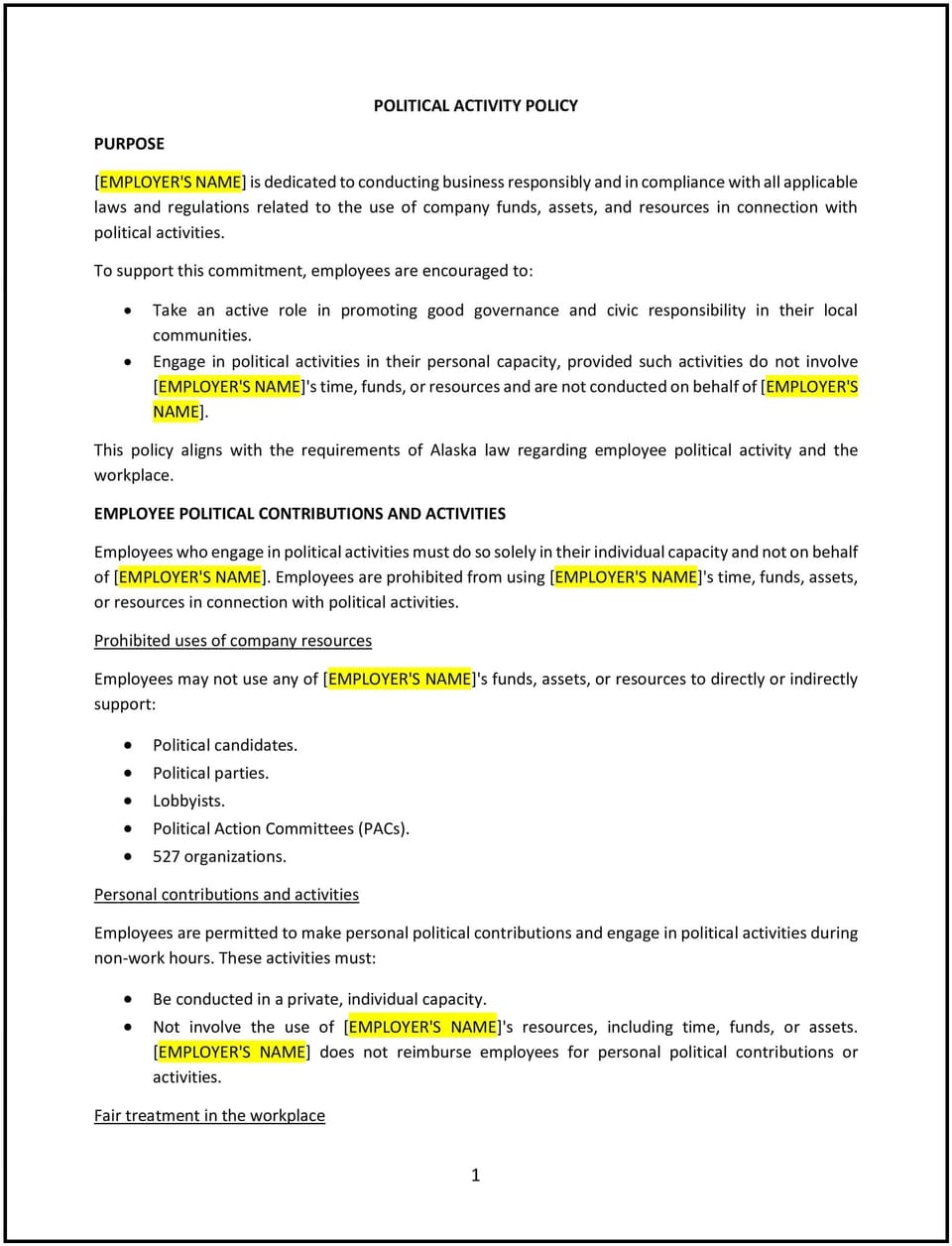Political activity policy (Alaska): Free template

Political activity policy (Alaska)
In Alaska, a political activity policy provides guidelines for employees engaging in political activities to ensure that their actions do not conflict with workplace responsibilities or the company’s interests. This policy helps maintain a neutral and inclusive work environment while respecting employees’ rights to participate in political activities outside of work.
By implementing this policy, businesses can minimize workplace disruptions and protect their reputation.
How to use this political activity policy (Alaska)
- Define acceptable activities: Clarify what political activities are permissible during work hours or on company premises, such as voting or attending civic events with prior approval.
- Address prohibited actions: Specify activities that are not allowed, such as campaigning during work hours, using company resources for political purposes, or pressuring colleagues to support particular views.
- Include off-duty conduct guidelines: Emphasize that employees’ off-duty political activities must not interfere with their job performance or create conflicts of interest with the company.
- Protect employee rights: Reiterate that employees have the right to engage in political activities outside of work without fear of retaliation or discrimination.
- Provide reporting procedures: Outline how employees can report concerns or violations of the policy, such as inappropriate political discussions or misuse of company resources.
Benefits of using a political activity policy (Alaska)
A political activity policy provides several advantages for businesses in Alaska. Here’s how it helps:
- Maintains workplace neutrality: Prevents political disagreements from disrupting the workplace or affecting team dynamics.
- Protects company reputation: Ensures employees’ political activities do not create conflicts or harm the company’s public image.
- Supports compliance: Helps businesses adhere to state and federal laws regarding political activity in the workplace.
- Respects employee rights: Balances the company’s need for neutrality with employees’ rights to engage in political activities outside work.
- Provides clarity: Establishes clear expectations for employees, reducing misunderstandings or potential conflicts.
Tips for using a political activity policy (Alaska)
- Address remote work concerns: Include provisions for political activities in virtual settings, such as video meetings or online chats.
- Foster inclusivity: Emphasize the importance of respecting diverse political beliefs to maintain a harmonious workplace.
- Monitor compliance: Regularly review company practices to ensure alignment with the policy and address any violations promptly.
- Educate employees: Provide training or resources to help employees understand their rights and responsibilities under the policy.
- Review regularly: Update the policy to reflect changes in laws, workplace dynamics, or company priorities.
Q: How can I ensure political neutrality in the workplace?
A: Clearly communicate the expectations outlined in this policy, train managers to handle potential conflicts, and monitor for adherence to the policy.
Q: What should I include in the policy to address off-duty political activities?
A: Emphasize that employees have the right to participate in political activities outside work, provided these activities do not interfere with job performance or create conflicts of interest.
Q: How should I handle political disputes between employees?
A: Encourage open communication but set boundaries to prevent workplace disruptions. Address issues promptly and ensure employees feel respected and heard.
Q: Can businesses set limits on political activities at work?
A: Yes, businesses can prohibit activities such as campaigning during work hours, using company resources for political purposes, or creating an environment of undue influence.
Q: How often should this policy be reviewed?
A: The policy should be reviewed annually or when changes occur in state or federal regulations or workplace dynamics.
This article contains general legal information and does not contain legal advice. Cobrief is not a law firm or a substitute for an attorney or law firm. The law is complex and changes often. For legal advice, please ask a lawyer.


